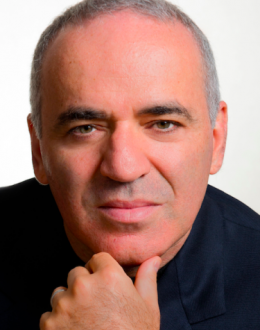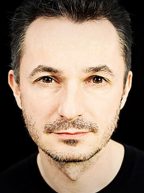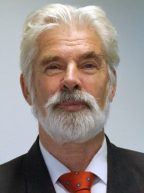Garry Kasparov keynote speaker
- Achieving Goals
- Business Strategy
- Chess, Politics and Computers
- Creativity
- Human Rights
- Strategic Thinking
- Strategy
Born in Baku, Azerbaijan, in the Soviet Union in 1963, Garry Kasparov became the under-18 chess champion of the USSR at the age of 12 and the world under-20 champion at 17. He came to international fame at the age of 22 as the youngest world chess champion in history in 1985. He defended his title five times, including a legendary series of matches against arch-rival Anatoly Karpov. Kasparov broke Bobby Fischer’s rating record in 1990 and his own peak rating record remained unbroken until 2013. His famous matches against the IBM super-computer Deep Blue in 1996-97 were key to bringing artificial intelligence, and chess, into the mainstream.
Kasparov’s outspoken nature did not endear him to the Soviet authorities, giving him an early taste of opposition politics. He became one of the first prominent Soviets to call for democratic and market reforms and was an early supporter of Boris Yeltsin’s push to break up the Soviet Union. In 1990, he and his family escaped ethnic violence in his native Baku as the USSR collapsed. His refusal that year to play the World Championship under the Soviet flag caused an international sensation. In 2005, Kasparov, in his 20th year as the world’s top-ranked player, abruptly retired from competitive chess to join the vanguard of the Russian pro-democracy movement. He founded the United Civil Front and organized the Marches of Dissent to protest the repressive policies of Vladimir Putin. In 2012, Kasparov was named chairman of the New York-based Human Rights Foundation, succeeding Vaclav Havel. Facing imminent arrest during Putin’s crackdown, Kasparov moved from Moscow to New York City in 2013.
The US-based Kasparov Chess Foundation non-profit promotes the teaching of chess in education systems around the world. Its program already in use in schools across the United States, KCF also has centers in Brussels, Johannesburg, Singapore, and Mexico City. Garry and his wife Daria travel frequently to promote the proven benefits of chess in education and have toured Africa extensively.
Kasparov has been a contributing editor to the Wall Street Journal since 1991 and is a regular commentator on politics and human rights. He speaks frequently to business and political audiences around the world on innovation, strategy, individual freedom, and achieving peak mental performance. He is a Senior Visiting Fellow at the Oxford-Martin School with a focus on human-machine collaboration. Kasparov’s book How Life Imitates Chess on decision-making is available in over 20 languages. He is the author of two acclaimed series of chess books, My Great Predecessors and Modern Chess.
Kasparov’s new book, Winter Is Coming: Why Putin and the Enemies of the Free World Must Be Stopped, was released by PublicAffairs in October 2015. He describes the book as a mix of “one part history of the rise and fall of Russian democracy and the West’s role in both, from Gorbachev’s retreat from Eastern Europe to Putin’s invasion of Ukraine in 2014; one part current events with an analysis of the current security crisis and how and why the countries of the free world must unite to fight back against thugs and dictators; and one part personal memoir of my life as a citizen, witness, and activist in the USSR, democratic Russia, and Putin’s Russia.”

Renowned Authority on Climate Science and Energy Technologies, Former Undersecretary...




